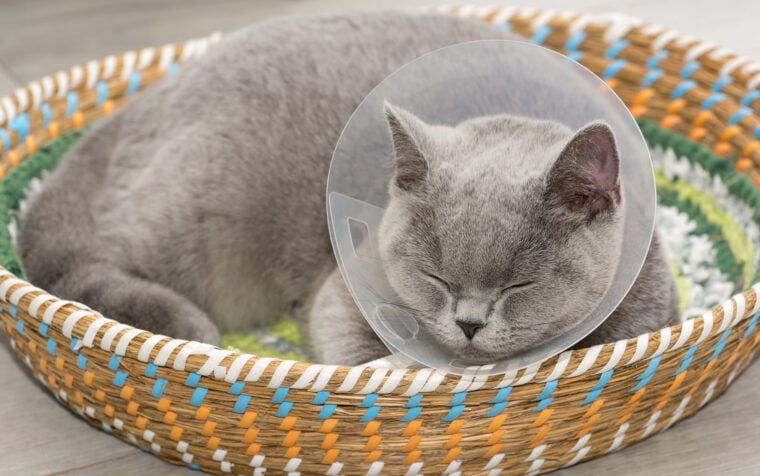
After any surgery, your cat will need to recover for some time. Cats are not known to be quite cooperative when you need them to. So, you will need to be very prepared after a spay or neuter.
Some cats might recover surprisingly quickly and become active right after surgery. However, you will need to keep your cat from jumping around to make their recovery smooth, support their healing, and allow them to rest. You will have to monitor their movement post-op to keep them from injuring themselves and to allow their surgical wound to heal effectively. Follow your vet’s instructions carefully and, if in doubt, contact them without delay.
Here are some of the ways you can keep your cat from jumping after surgery.
The 10 Ways to Prevent Your Cat from Jumping After Surgery
1. Monitor Your Cat Closely
This is the best way you can keep your cat safe after surgery. Cats can quickly get back to their normal activities after surgery, but they need to rest.
You will need to keep an eye on your cat as much as possible to keep them from hurting themselves. You may need to cancel some plans and stay around more or even book some time off work to keep a close eye on your kitty. If you see that your cat is getting active and wants to jump around, you should take them back to where they rest. Cats love attention, and some cuddling will keep them from moving around.
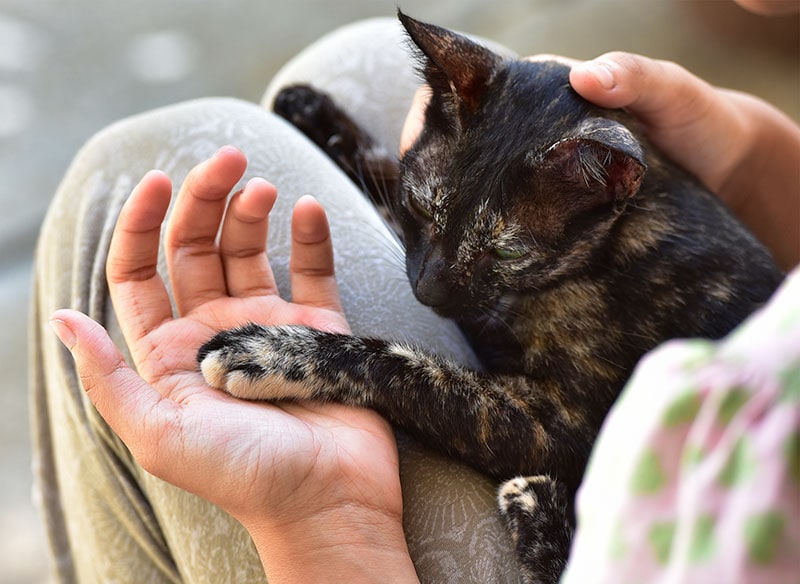
2. Remove All the Cat Trees Around the House
Your cat will want to jump onto the cat trees if they are up. So, to keep your cat from jumping on the cat tree, you will need to take the tree down. You can place the tree on its side if you do not want to remove the tree altogether.
You can also cover the cat tree with a blanket. It’s not a pretty sight, but it will just be that way till your cat recovers.
3. Keep Your Cat Indoors
It is compulsory to keep your cat indoors after their surgery.1 There are many distractions outside that might make your cat jump around. They might even forget they had surgery when they see something to run after, like a squirrel.
Depending on your cat’s personality, you can consider limiting their time on the window to reduce the urge to be outside. Cats also start to jump around when they see something exciting outside.
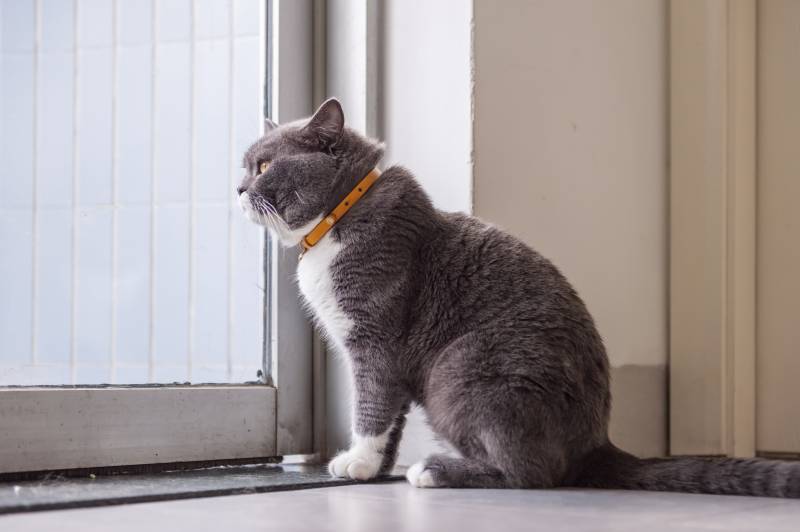
4. Keep Their Toys Away
Taking their toys away might sound depressing, but it is a great idea to keep them away post-surgery. Cats get excited when they see their toys, and they might jump and run around.
5. Keep Your Cat Away From Other Cats
Other cats will get attracted to your cat’s incision and new smells. They may want to lick or chew on your cat’s unhealed wound, which will cause another mess.
If you have many cats in your house, you need to pay close attention to the post-op cat while the others are around. You can keep the cats in separate rooms until your post-op cat completely heals. Be on the lookout for rough play or catfights when you have a recovering cat because they might want to jump, climb, hop, or crawl.
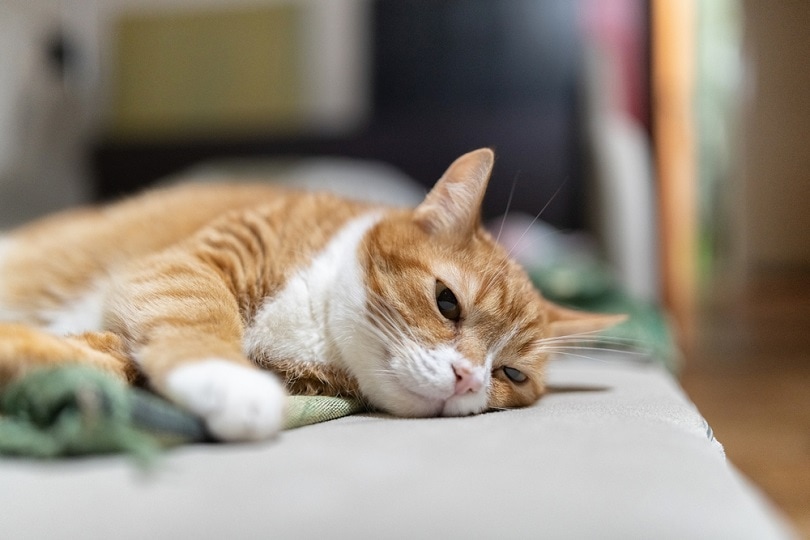
6. Avoid Loud Noises
Cats have a very sensitive sense of hearing. This makes noises that are normal to human ears louder for cats. If your cat hears a loud noise, they might be startled by the loud noise, which can make them jump around or even run.
It can be hard to avoid some sounds such as thunder, but you can try to not play your music too loudly and ensure that your TV volume is not too loud to startle your cat.
7. Get a Cone for Your Cat
Your vet will probably recommend and give you a protective collar. If, for whatever reason, your vet doesn’t give you one, make sure you get one from a pharmacy on your way home. The primary function of the cone is to make sure that the incision is not licked, bit, or scratched. Your cat won’t enjoy it, but it is for the cat’s well-being.
The cone will also discourage your cat from jumping around by preventing your cat from checking out high areas. It also discourages irregular activity because your cat is quite uneasy and unbalanced. It pretty much keeps your cat less active until they heal.
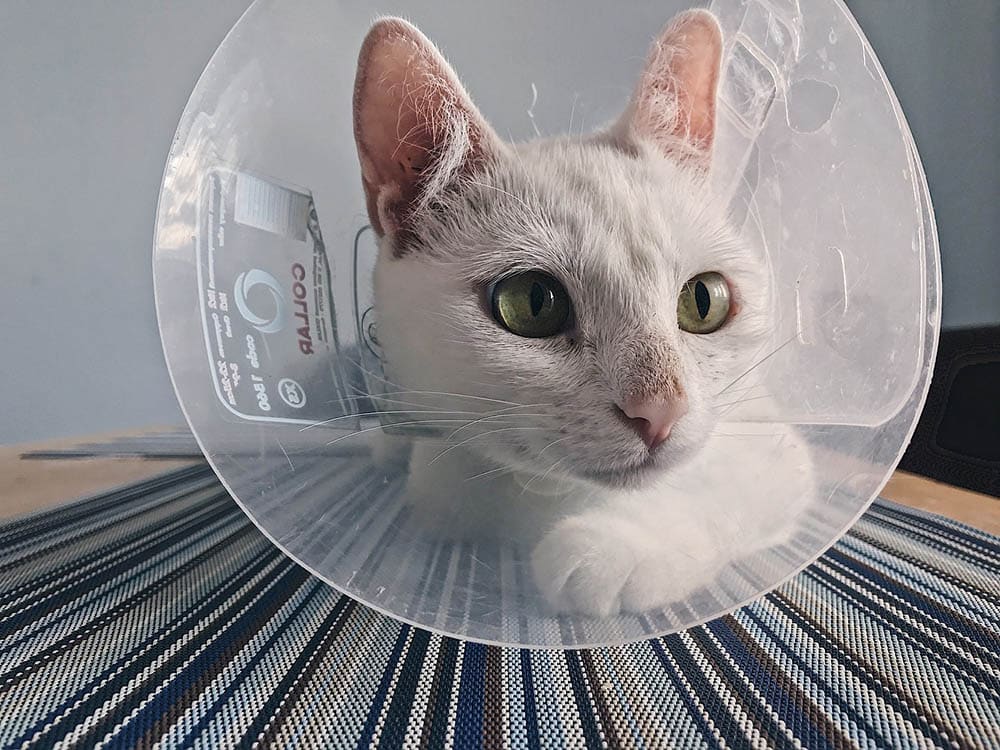
8. Keep Them in a Crate
Keeping your cat in a crate might seem cruel, but certain surgeries or conditions require your cat to do “cage rest”, if this is the case, it is essential that you follow your vet’s instructions. After surgery, your cat is highly vulnerable, and keeping them in a crate might be the best thing at the time.
If your cat keeps jumping around, placing them in a crate might be the best thing for them. If you are not able to keep an eye on your cat, a crate is the best way to keep them safe.
Most pet owners do not like putting their pets in crates, but it will be for just a short time before they heal. If you can’t place your cat in a crate, discuss it with your vet and you might be able to place them in a small room with little furniture by themselves so they can remain calm to speed up their recovery.
9. Keep a Relaxed Environment
It’s a great idea to keep the home environment as calm as possible. Avoid visitors, especially if they bring pets with them. Your cat will appreciate some peace and quiet during their recovery, and the less excitement in your home, the less they will need to interact with their surroundings.

10. Follow Through With Their Medication
While keeping all the above suggestions in mind, ensure that you follow the veterinarian’s direction to the letter. This will fasten your pet’s recovery process.
Make sure you follow the directions carefully when giving your cat their medication. Do not skip any unless otherwise stated. After surgery, your cat’s appetite might be slightly pickier. This is not something to worry about unless your cat refuses to eat or you struggle to give them the medication. If this is the case, make sure to contact your vet for expert advice.
Summary
We hope all the mentioned suggestions will keep your cat calm and not jumping around. Keep in mind that the main objective here is to limit your cat’s activity till they completely heal from the surgery and your vet gives you the green light. Your kitty will also need some extra love and affection during recovery to keep them well-rested and relaxed. More than anything, remember to follow your vet’s instructions for quick recovery.
- Related Read: Do Cats Have to Fast Before a Surgery? (Vet Answer)
Featured Image Credit: Lilia Solonari, Shutterstock








